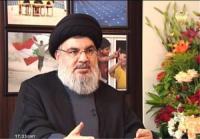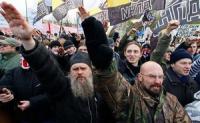-
Newly released Bin Laden papers confirm Iran, Al Qaeda allied as enemies of America
The CIA has released thousands of documents and other files recovered from Osama bin Laden’s compound in Pakistan, when the terrorist leader was killed, providing “invaluable insights” into the terror group’s operations, and confirming previous reporting on its ties to Iran. Though ties between al-Qaeda, the Sunni terrorist organization, and Iran, the Shiite nation that has been designated by the United States State Department as “foremost state sponsor of terrorism,” have been reported for a while now, they have often been discounted due to their diverging religious philosophies.
-
-
Protecting major sport venues
Three major sporting leagues — the National Football League (NFL), Major League Baseball (MLB), and National Basketball League (NBA) — have played a key role in significantly upgrading and strengthening security at stadiums and arenas throughout the country with the help of the Department of Homeland Security Science and Technology Directorate’s SAFETY Act. The Support Anti-Terrorism by Fostering Effective Technologies (SAFETY) Act incentivizes private sector investment in protecting the nation’s critical infrastructure and the public by providing liability risk mitigation and litigation tools for claims that stem from or relate to an act of terrorism where a SAFETY Act covered technology (called a qualified anti-terrorism technology) is used.
-
-
U.S. shouldn’t give up benefits of ‘green card lottery’ over low risk of terrorism
After a man barreled down a New York City bike path on Oct. 31, killing eight, President Donald Trump reacted by calling for an end to the “green card lottery” program that allowed the attacker to enter the country. As someone who researches the impact of immigration on workers, I believe their plans to change who can enter the country legally is a big mistake. We would be giving up a program that benefits American workers with very little chance of a gain in safety. Immigration that emphasizes diversity, rather than merely merit, tends to attract more people who specialize in occupations uncommon among U.S.-born workers. And, in fact, this is the key source of the well-known economic benefits of immigration. Studies show this tendency toward job specialization is a key reason the large volume of low-skill immigration does not drive down incomes of Americans. Other research shows that simply encouraging immigration from diverse origins lifts wages. Put differently, there is direct evidence that the sort of diversity that the green card lottery encourages makes all Americans better off. It would be a shame to give all of that up because of a tiny risk of terrorism.
-
-
Most Central Asia terrorists radicalized while living as migrants abroad: Expert
Sayfullo Saipov, the 29-year old terrorist who killed eight and injured twelve by driving a rented van down a bike lane in New York City, came to the United States from Uzbekistan. The attack by an Uzbek man may indicate a growing terrorist threat from Central Asia. A Central Asia security expert says that there have been several men from Central Asia who committed acts of terrorism abroad – most recently in Stockholm, St. Petersburg, and New York – but that when we examine these cases, we find that “The common thread here seems to be that they their radicalization did not take place in Central Asia. They were radicalized while living the lives of migrants elsewhere. This poses as many questions for the United States as for Central Asian countries. In fact, more.”
-
-
MSU urged to pull the plug on an “eco-terrorism” video game
Michigan State University’s award-winning computer game development lab has developed a new computer game called “Thunderbird Strike.” Dr. Elizabeth LaPensee, the game’s designer, says that, among other things, the game is designed to “bring awareness to pipeline issues and contribute to the discontinuation of [Enbridge’s] Line 5.” Enbridge’s Line 5 is a 645-mile, 30-inch-diameter pipeline that travels through Michigan’s Upper and Lower Peninsulas. In the game, players get to blow up pipelines. Oil industry officials argue that the game, in effect, encourages players to engage in acts of domestic terrorism.
-
-
Sandia’s international peer mentorship program improves management of biorisks
The world is becoming increasingly interconnected. While this has definite advantages, it also makes it easier to spread disease. Many diseases don’t produce symptoms for days or weeks, far longer than international flight times. For example, Ebola has an incubation period of two to twenty-one days. Improving biosafety practices around the world to prevent the spread of diseases to health care workers and biomedical researchers is an important part of halting or minimizing the next pandemic, said Eric Cook, a Sandia National Laboratories biorisk management expert.
-
-
The Devil’s puzzle: Defining international and domestic terrorism
It’s becoming a familiar scene. A vehicle becomes a weapon of terror. This time in New York City, where a driver in a rental truck suddenly careened down a bike and pedestrian path on the west side of the city on Tuesday, killing at least eight and injuring more than ten people. New York officials say it was an act of terror, and the incident is likely to reignite the debate on what constitutes domestic and international terrorism and whether it matters. An argument can be made that distinguishing between what constitutes an act of terrorism and what doesn’t still provide significant value.
-
-
Israel demolishes Gaza tunnel, killing 9 Palestinian militants
The Israel military (IDF) on Monday morning destroyed a tunnel Hamas fighters were building under the Israel-Gaza Strip. The Hamas Health Ministry in Gaza said that nine Palestinians were killed and eight others were wounded when the IDF blew up the tunnel. Israel this summer began work on an underground barrier meant to counter attack tunnels.
-
-
Former Argentinian president defends secret agreement with Iran in terror probe
On Thursday, former Argentine President Cristina Fernández de Kirchner appeared in federal court and denied that the purpose of the secret pact with Iran, signed by her government, was to cover-up Tehran’s involvement in the 1994 bombing of the AMIA Jewish community center that killed eighty-five people.
-
-
Modern civilization does not diminish violence
Modern civilization may not have dulled mankind’s bloodlust, but living in a large, organized society may increase the likelihood of surviving a war, researchers say. They argue that while larger, modern-day societies may have a larger number of soldiers or combatants who die, they represent a smaller percent of the total population. In addition, people who live in modern-day nations are not less violent than their ancestors or people who currently live in small-scale hunting, gathering and horticultural societies.
-
-
European Muslims perceive the EU more positively than non-Muslim Europeans
A new study found that Muslims in Europe have a more positive view of the European Union (EU) compared to all other groups of the European population. “On average, Muslims have a higher level of trust in EU institutions than members of other religious or non-religious groups such as Christians and those unaffiliated with any religion,” says a researcher.
-
-
Int’l military experts: Next Hezbollah war with Israel is inevitable

A war between Israel and the Iranian-backed terrorist organization Hezbollah is inevitable and will likely be “more violent and destructive” than previous conflicts, according to a report released on Wednesday by former senior defense officials, known collectively as the High Level Military Group (HLMG). The HLMG’s report describe Hezbollah as being “widely considered to be the most powerful non-state armed actor in the world.”
-
-
Deeper understanding of ISIS propaganda can help in the fight against terrorism
New research argues that ISIS propaganda is a form of strategic communication and that analyzing their materials through a neo-institutional framework (a theory that examines how a group’s cultural norms and rules guide their choices,) can help researchers and military better investigate extreme propagandists’ techniques and develop ways to combat them.
-
-
The dangerous combination of civil war and threat of global pandemics
There are thirty civil wars underway around the globe, where civilians are dealing with death and destruction as well as public health emergencies exacerbated by the deadly march of conflict. And yet today, of the nearly 200 countries on this planet, only six nations — three rich ones and three poor ones — have taken steps to evaluate their ability to withstand a global pandemic. “The bottom line is that despite the profound global threat of pandemics, there remains no global health mechanism to force parties to act in accordance with global health interests,” says one expert. “The unpredictability of a serious infectious outbreak, the speed with which it can disseminate, and the fears of domestic political audience can together create a powerful destabilizing force,” says another.
-
-
Unprecedented levels of cross-border cooperation among extreme right groups: Report

New research released the other day by ISD, a counter-extremism NGO, reveals increasing collaboration among extreme far-right groups globally. The report shows how extreme right groups have been opportunistically, and effectively, bridging ideologies and adapting their tone to manipulate legitimate social grievances – immigration, freedom of speech, and terrorism – in order to reach and radicalize mainstream parties and movements.
-
- All
- Regional
- Water
- Biometrics
- Borders/Immig
- Business
- Cybersecurity
- Detection
- Disasters
- Government
- Infrastructure
- International
- Public health
- Public Safety
- Communication interoperabillity
- Emergency services
- Emergency medical services
- Fire
- First response
- IEDs
- Law Enforcement
- Law Enforcement Technology
- Military technology
- Nonlethal weapons
- Nuclear weapons
- Personal protection equipment
- Police
- Notification /alert systems
- Situational awareness
- Weapons systems
- Sci-Tech
- Sector Reports
- Surveillance
- Transportation
Advertising & Marketing: advertise@newswirepubs.com
Editorial: editor@newswirepubs.com
General: info@newswirepubs.com
2010-2011 © News Wire Publications, LLC News Wire Publications, LLC
220 Old Country Road | Suite 200 | Mineola | New York | 11501
Permissions and Policies
Editorial: editor@newswirepubs.com
General: info@newswirepubs.com
2010-2011 © News Wire Publications, LLC News Wire Publications, LLC
220 Old Country Road | Suite 200 | Mineola | New York | 11501
Permissions and Policies
